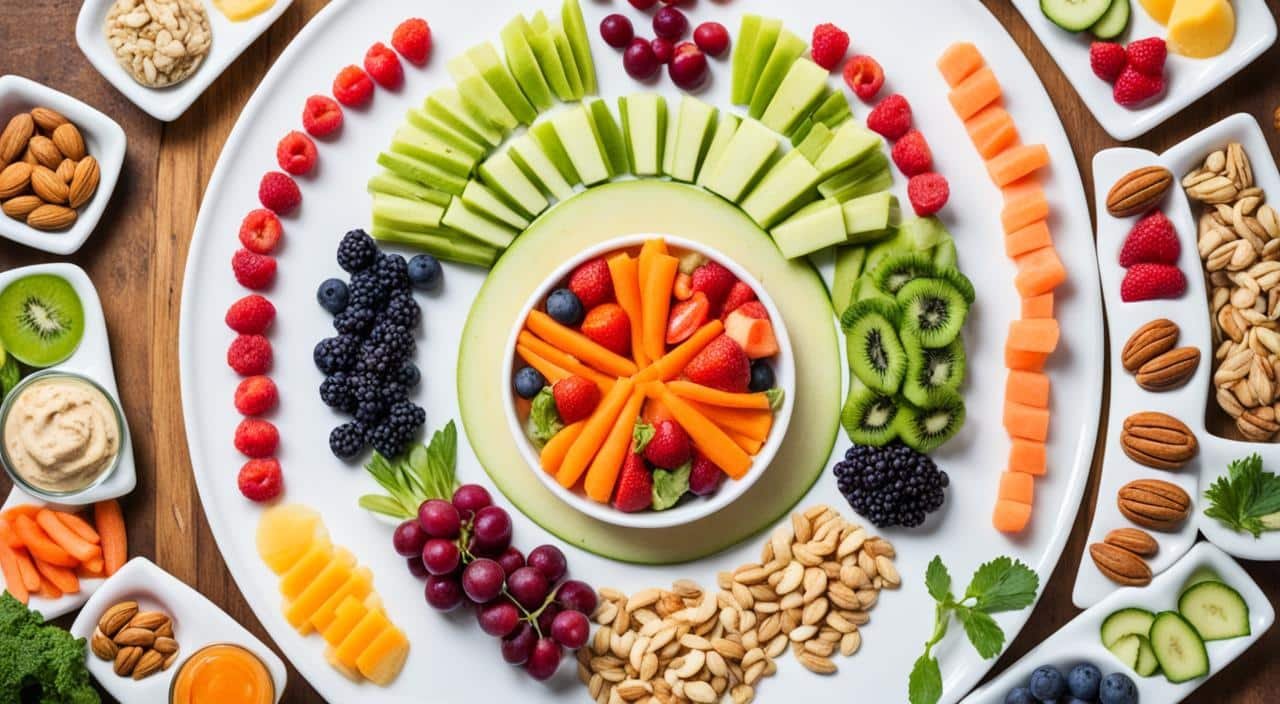Healthy Eating Tips is key to feeling great and staying healthy. It helps you keep a good weight, lowers the risk of diseases, and gives you energy. This article shares ten top tips for eating well. It shows how to choose the best foods, keep your plate balanced, and control how much you eat.
These strategies are easy to follow. They help you stay healthy and enjoy life more. You’ll also learn how to eat less salt and sugar. Plus, you’ll get advice on eating good fats and staying at a healthy weight. These tips are for anyone, whether you’re just starting or already care a lot about health.
Key Takeaways
- Prioritize nutrient-dense foods, such as a variety of colorful fruits and vegetables, to ensure you’re getting a wide range of essential vitamins, minerals, and antioxidants.
- Maintain a balanced plate by incorporating lean protein sources, filling half your plate with vegetables, and choosing whole, unprocessed carbohydrates.
- Stay hydrated by drinking sufficient amounts of water throughout the day and incorporating hydrating foods like fruits and vegetables.
- Practice portion control by using smaller plates and cultivating mindful eating habits to avoid overeating and support weight management.
- Reduce your intake of sodium and added sugars by limiting processed foods and cooking more meals at home with fresh, whole ingredients.
Also Read : What Is Credit Risk And Why Is It Important In Finance?
Prioritize Nutrient-Dense Foods
Focusing on nutrient-rich foods is key for good health. By adding colorful fruits and vegetables to your diet, you not only get a pretty plate but also vital vitamins, minerals, and antioxidants. Eating more fiber from foods like whole grains, legumes, nuts, and seeds supports your gut, keeps you full, and keeps your blood sugar stable.
Also Read : Top 10 Benefits Of Apples For Your Health
Embrace a Variety of Colors
Choose a range of fruits and vegetables to make meals beautiful and healthy. From bright greens and reds to bold purples and oranges, each hue carries special nutrients for good health.
Increase Fiber Intake
Foods with fiber like whole grains, legumes, nuts, and seeds, are vital for your gut and blood sugar. Eat these whole, unprocessed foods to stay full longer and avoid sugar spikes from refined carbs.
Also Read : How Can Celebrating Small Successes Keep Students Motivated?
Choose Whole, Unprocessed Foods
Avoiding overly processed foods and selecting natural, lightly processed choices is wise. This strategy lowers your sugar, bad fat, and salt intake, while giving you many nutrients and antioxidants through unprocessed foods.
Balance Your Plate
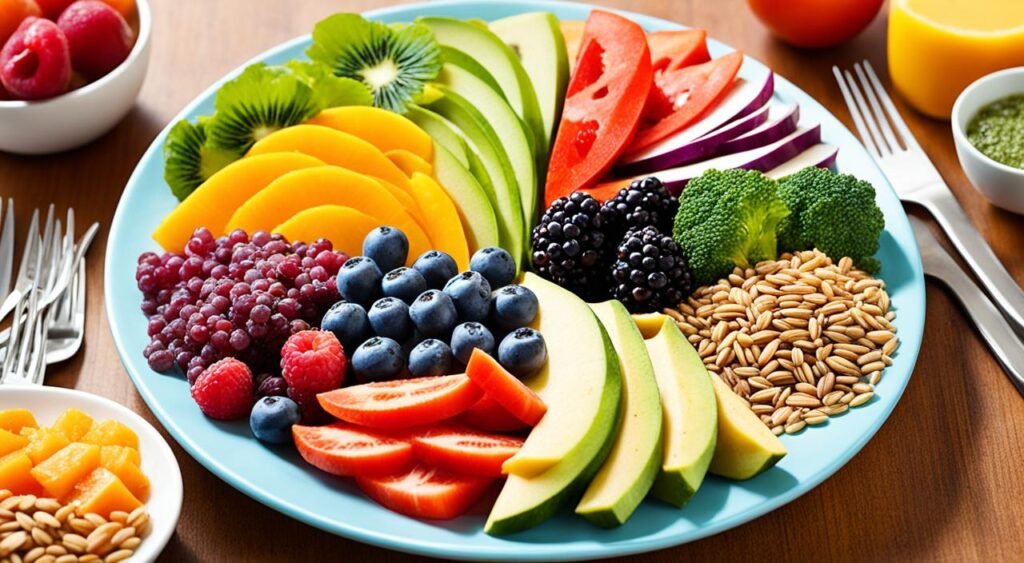
Creating a balanced plate matters a lot. It ensures we get the right amounts of carbs, proteins, and fats. Eating a mix of nutrient-rich foods helps keep us healthy and feeling good.
Also Read : How Can You Make Cheese Pizza ?
Incorporate Lean Protein Sources
Lean proteins like fish, eggs, and plant foods are great for your muscles. They help keep your body in good shape. Plus, they give you the energy you need to make it through the day.
Fill Half Your Plate with Vegetables
Eating lots of vegetables is key. They add fiber, vitamins, and minerals to your diet. Veggies are filling but low in calories. They also help keep your blood sugar steady, playing a big role in a healthy diet.
Eating a mix of foods helps support your health. A balanced diet is the first step to living well.
Also Read : How Can You Make Cheese Sandwich?
Stay Hydrated
Keeping hydrated is key to good health. Water is crucial for many body functions like keeping us cool and digesting food. It also moves nutrients around our body. To avoid tiredness and poor thinking, be sure to drink water all day. Also, eat fruits and veggies since they help with fluids too.
| Benefits of Staying Hydrated | Tips for Increasing Fluid Intake |
|---|---|
|
|
“Proper hydration is not just about drinking water – it’s about nourishing your body with the fluids it needs to function at its best.”
Put hydration first to benefit your health. Follow these easy tips and feel the positive effects of staying hydrated.
Practice Portion Control
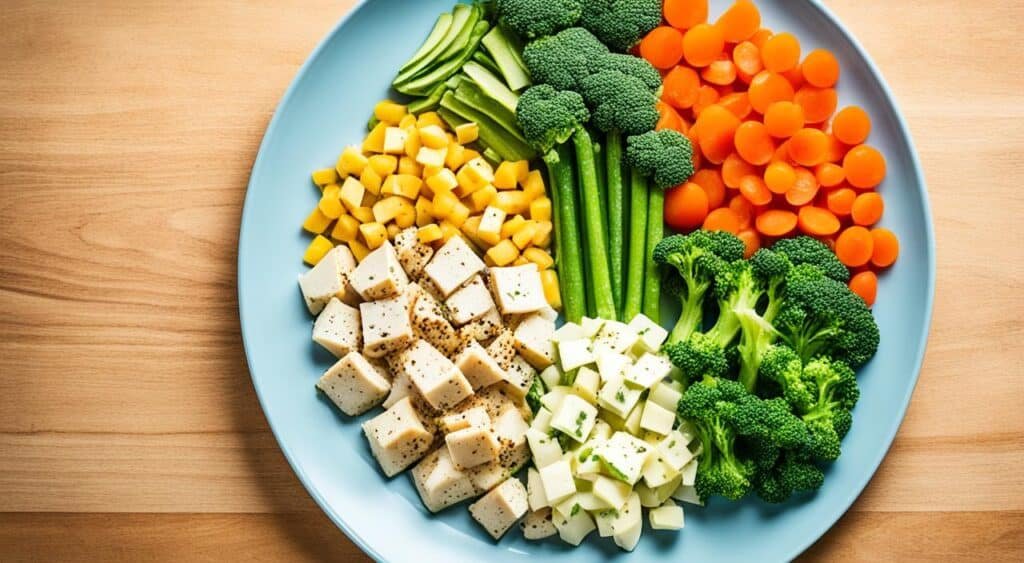
Practicing portion control is vital for staying fit and not eating too much. A simple trick is to pick smaller plates. This makes your plate look full even with less food. It tricks your brain into being satisfied.
Eating mindfully is crucial too. This means paying full attention when you’re eating. Watch your hunger and fullness cues. Try to avoid being distracted. These steps really help with portion control and make your food relationship healthier.
Use Smaller Plates
Choosing smaller dishes is a smart move for portion control. A smaller plate can visually make your meal look bigger. This helps you eat fewer calories while still feeling full. It’s a small change that can help a lot with managing your weight.
Mindful Eating Habits
Cultivating mindful eating habits is key for portion control. Be fully there when you eat. Listen to your body – know when you’re full or hungry. Try not to let other things steer your attention. This kind of eating helps you naturally eat just the right amount. It’s a better way to handle your weight and health.
Reduce Sodium Intake

It’s key to cut down on sodium for a strong heart and to manage high blood pressure. You can lower your lowsalt intake by eating less processed food. These often have a lot of salt. Instead, try to cookathome using fresh, whole ingredients. This way, you control how much salt goes into your food.
Limit Processed Foods
Processed foods usually have too much salt. They do this to taste better and last longer. When you eat less of these, you bring your salt intake down. This small change moves you towards a healthier, lowsalt way of living.
Cook at Home More Often
Cooking with fresh foods at home lets you manage how much salt you eat. With cookathome, you add herbs and spices for flavor. This reduces the need for salt. Your taste buds will still be happy!
Limit Added Sugars
Limiting added sugars is key to eating well. They are in many processed foods. Eating too much can lead to health issues like diabetes and weight gain. So, watch your sugarawareness and read food labels. Pick foods with little or no added sugars.
Read Nutrition Labels Carefully
When you read nutrition labels, focus on total sugar count. Look for words like “sugar” or “syrup” in the ingredients. Choose foods low in added sugars. And get your sweet kick from fruitlovers.
Satisfy Sweet Cravings with Fruit
For a sweet treat, go for fresh fruits. They have their own natural sugars. Plus, they’re packed with good stuff like fiber and vitamins. Fruit snacks or desserts are a healthy way to indulge your sweet tooth.
Choose Healthy Fats
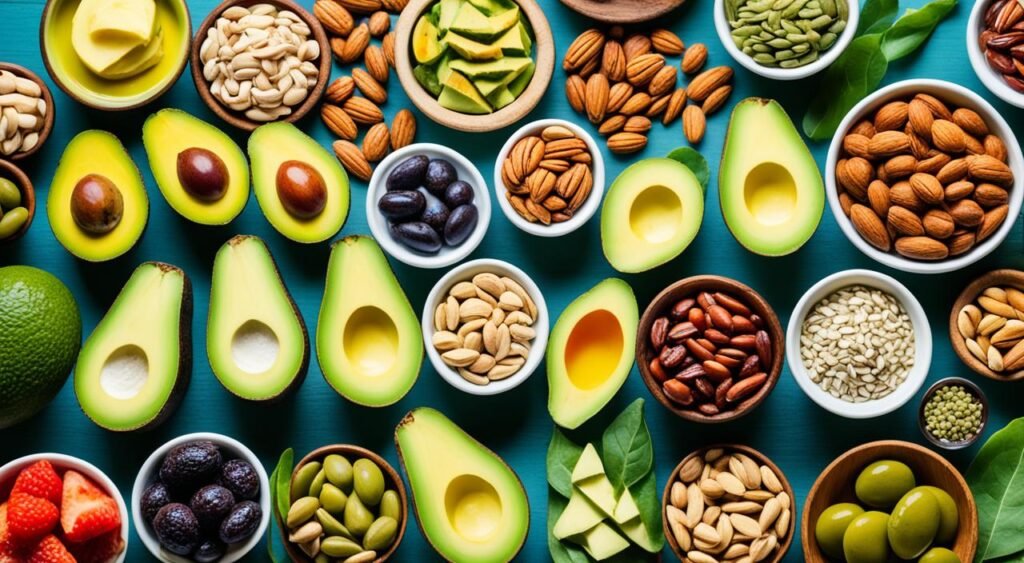
Adding healthy fats to your diet is key for good health. Unsaturated fats found in avocados, nuts, seeds, and olive oil are great. They lower cholesterol and cut the risk of heart disease.
Opt for Unsaturated Fats
Monounsaturated and polyunsaturated fats are better for you. They lower bad cholesterol and boost good cholesterol. This helps your heart stay healthy.
Incorporate Fatty Fish
Adding fatty fish like salmon, mackerel, and sardines to your diet is smart. They’re packed with omega-3 fatty acids. Omega-3s are anti-inflammatory and support brain and heart health.
Healthy Eating Tips for Weight Management
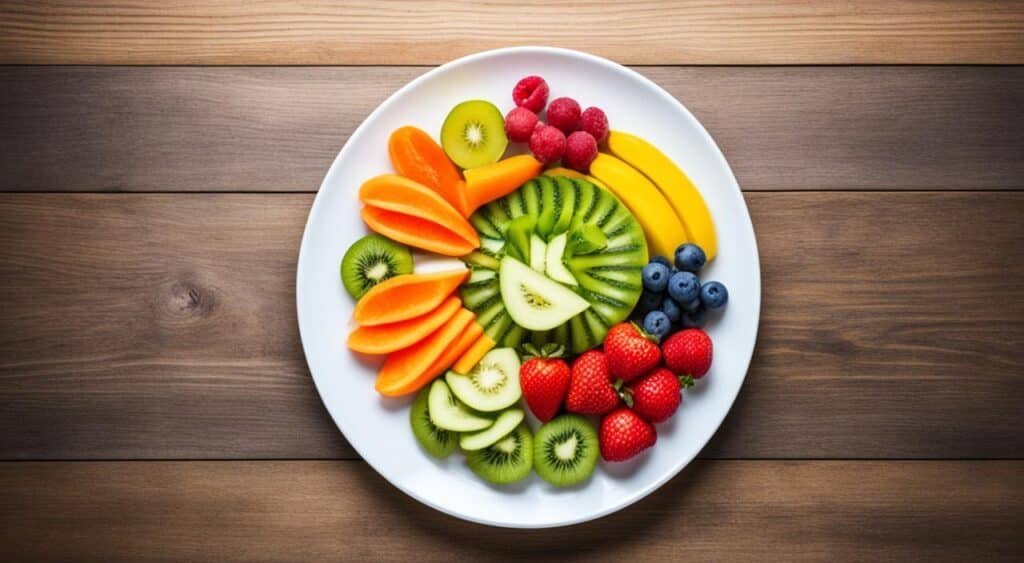
Eating right is key for managing your weight. With smart food choices and habits, you can help keep your weight in check. This also makes sure your body gets all the important nutrients it needs.
Boost Metabolism with Protein
Foods rich in lean protein, like chicken, turkey, fish, legumes, and eggs, can rev up your metabolism. They also help your muscles grow and stay strong. Adding these proteinsources to your meals and snacks boosts the calories you burn. This supports your journey to shed pounds.
Meal Planning and Prep
Developing a mealprep routine can change the game for you. It helps you eat healthier, control how much you eat, and keeps good food ready to grab. With this in place, sticking to your meal plan and making lasting eating change is easier.
Also Read : Enjoy Life’s Sweet Moments: Guide To Eating Cake
Healthy Eating Tips for Specific Diets
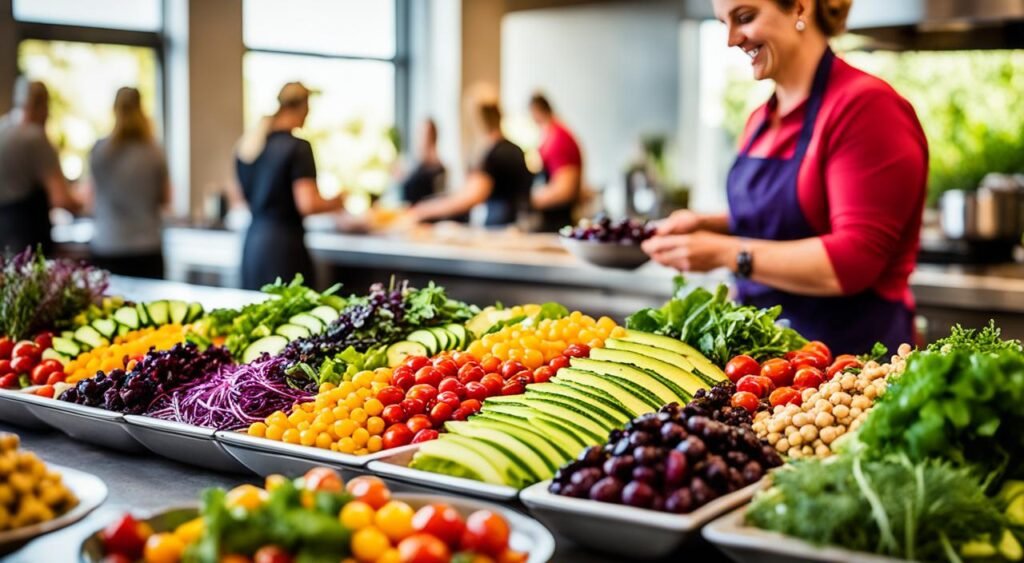
Healthy eating can be adjusted to different dietary needs. If you choose a plant-based diet or focus on heart-healthy eating, there are ways to eat smart. These methods help you get the best nutrients for good health.
Plant-Based Eating Tips
Eat a mix of fruits, vegetables, grains, legumes, nuts, and seeds on a plant-based diet. These foods are filled with vitamins, minerals, and fiber. They are good for your body and can lower the risk of diabetes. Make sure to include foods like tofu, tempeh, and lentils for protein every day.
Heart-Healthy Eating Tips
Choosing foods with unsaturated fats benefits your heart. Consider eating fatty fish, avocados, and olive oil. This way of eating can boost heart health and lower heart disease risk. Including omega-3 fish like salmon in your diet is great for your heart. A Mediterranean-style diet is also good. It focuses on plants, healthy fats, and lean proteins. It helps lower the risk of heart disease and helps manage diabetes better.
Conclusion
So, the top 10 tips for healthy eating are a great start. They help you make wise food choices and build habits that last. Focus on foods packed with nutrients, check your portion sizes, keep hydrated, and control your food amount. This way, you’re on a path to being well and enjoying life more.
These tips also show how to cut down on salt and sugar. They teach you about adding healthy fats and managing your weight by eating protein and planning meals carefully. No matter if you’re just beginning or already know a lot about staying healthy, you can use these tips. They fit any diet and goal, helping you improve your health.
By using these healthy eating tips every day, you can see lots of good changes. You’ll have more energy, manage your weight better, have less risk of getting sick, and feel better overall. Start with these hints and take the first step towards a better, more lively you.
